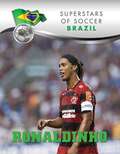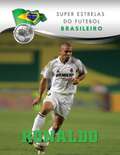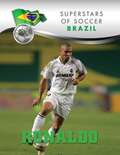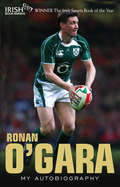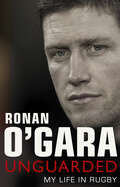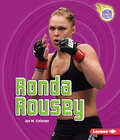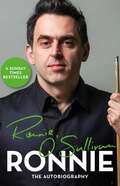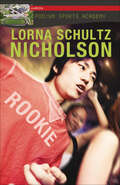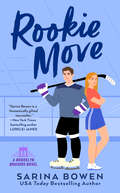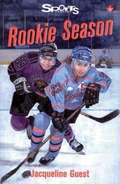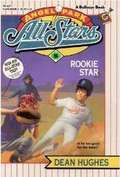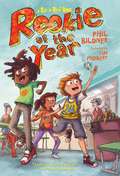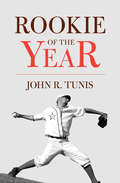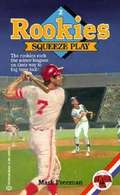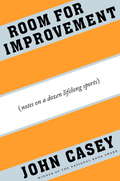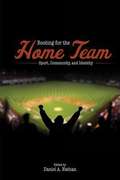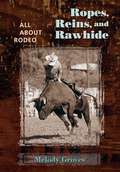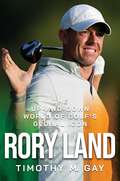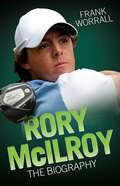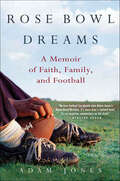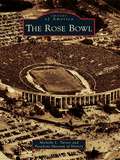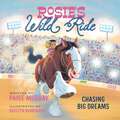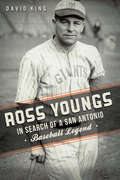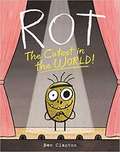- Table View
- List View
Ronaldinho (Superstars of Soccer)
by Aldo WandersmanNacido en una familia que tenía el fútbol en las venas, Ronaldinho mostró muy pronto habilidades especiales. Hoy día se celebran las hazañas del brasileño en todo el mundo deportivo. Sin duda es uno de los mayores defensores del planeta.
Ronaldo (Superstars of Soccer SPANISH)
by Aldo WandersmanEn la historia del fútbol internacional, Ronaldo es uno de los nombres más grandes. Tres veces la FIFA lo honró con el título de mejor jugador del mundo. Además, el brasileño es el máximo goleador en la historia de la Copa del Mundo. Es un verdadero héroe nacional--y un favorito de aficionados de todas partes.
Ronaldo (Superstars of Soccer)
by Aldo WandersmanEn la historia del fútbol internacional, Ronaldo es uno de los nombres más grandes. Tres veces la FIFA lo honró con el título de mejor jugador del mundo. Además, el brasileño es el máximo goleador en la historia de la Copa del Mundo. Es un verdadero héroe nacional--y un favorito de aficionados de todas partes.
Ronan O'Gara: My Autobiography
by Ronan O'GaraRonan O'Gara is one of the greatest sportsmen Ireland has ever produced. A brilliant kicker both from the hand and at penalty goals, a sublime orchestrator of play from the out-half position he has made his own, and a cool head in the pressure-cooker of club and international rugby, the list of the Cork man's achievements goes on and on. The leading points scorer in Irish rugby history, the Six Nations and the Heineken Cup. The architect of two amazing Munster triumphs in Europe. The man whose last minute drop-goal sensationally won the Grand Slam in 2009, Ireland's first for 61 years.In his candid, illuminating autobiography, O'Gara tells the story of those many on-field successes and, with brutal honesty, the darker days as well, most notably at the 2007 World Cup. He tells the inside story of Ireland's disappointments in France, and responds to the allegations about his personal life that made front-page news that autumn. Ronan O'Gara: My Autobiography is the unforgettable story of a rugby player at the top of his game, of a life lived to the full, and of a passionate and proud representative of the people of Cork and Ireland.
Ronan O'Gara: Unguarded
by Ronan O'GaraRonan O'Gara has been at the heart of Munster and Irish rugby for the past fifteen years. Now, as he comes to the end of a glittering playing career, it is time for him to reflect on those many successes and occasional failures with the straight-talking attitude that has become his trademark. Never one to shy away from the truth, the result is Ronan O'Gara: Unguarded.Packed full of anecdotes and analysis of the teammates O'Gara has been proud to share the shirt with, and of the coaches he has played under - often in controversial circumstances - this is the definitive record of an era when Munster rose to triumph in Europe, and Ireland to win the Grand Slam, before crashing down to earth again. It is simply the must-have rugby book of the year.
Ronda Rousey (Amazing Athletes Ser.)
by Jon M FishmanMixed martial arts (MMA) star Ronda Rousey is known for her incredible record of twelve wins and one loss and has been ranked the world's top fighter in her weight class. With nine of her twelve wins taking place in under a minute, Ronda is considered one of MMA's biggest superstars. Her journey to success started at the 2008 Olympics, where she won a bronze medal in judo. Learn more about how this impressive fighter became known as one of the most dominant athletes of our time.
Ronnie: The Autobiography of Ronnie O'Sullivan
by Ronnie O'SullivanRonnie is snooker's most written and talked about player, and its greatest showman. His supreme talent and style have made him the People's Champion and, as one commentator put it, 'the question is not how much does Ronnie O'Sullivan need snooker, but how much does snooker need Ronnie O'Sullivan?' A honest and candid account of his extraordinary life, Ronnie tells of the infant who was introduced to legendary snooker clubs at an impossibly early age; of the boy who frightened off the bookies aged just 12; of the teenager whose life was decimated when his father and mentor was sent to prison for life; and of the man dubbed the 'genius' of the modern game who regularly threatened to quit the sport to pursue other interests at the grand old age of 28.'A fine autobiography ... compelling' - Independent'O'Sullivan is as frank about his spell in the Priory clinic as he is about his father's murder conviction. His accounts of snooker tournaments and sketches of the sport's personalities will fascinate fans, but even snooker haters will be rooting for Ronnie in the game of life' - OK!
Ronnie: The Autobiography of Ronnie O'Sullivan
by Ronnie O'SullivanRonnie is snooker's most written and talked about player, and its greatest showman.His supreme talent and style have made him the People's Champion and, as one commentator put it, 'the question is not how much does Ronnie O'Sullivan need snooker, but how much does snooker need Ronnie O'Sullivan?' A honest and candid account of his extraordinary life, Ronnie tells of the infant who was introduced to legendary snooker clubs at an impossibly early age; of the boy who frightened off the bookies aged just 12; of the teenager whose life was decimated when his father and mentor was sent to prison for life; and of the man dubbed the 'genius' of the modern game who regularly threatened to quit the sport to pursue other interests at the grand old age of 28.'A fine autobiography ... compelling' - Independent'O'Sullivan is as frank about his spell in the Priory clinic as he is about his father's murder conviction. His accounts of snooker tournaments and sketches of the sport's personalities will fascinate fans, but even snooker haters will be rooting for Ronnie in the game of life' - OK!
Rookie (Lorimer Podium Sports Academy)
by Lorna Schultz NicholsonFresh off the plane from Vancouver, sixteen-year-old hockey player Aaron Wong is excited to be starting his first year at Podium, the Calgary school for top teen athletes. Aaron has to make friends and fit in at a new high school, while also adjusting to a new home and a family with a different culture than his own. Luckily, he finds a tight-knit group of friends who are elite athletes in their own sports to help show him the ropes. Things seem to be going well for the rookie—but the hockey team captain has it in for him. Aaron's world is turned upside down when the captain makes him the target of a brutal hazing at the team's first party. To turn his year around, Aaron has to overcome his embarrassment about the incident and confide in friends and coaching staff. Distributed in the U.S by Lerner Publishing Group
Rookie Move (A Brooklyn Bruisers Novel #1)
by Sarina BowenThe first novel in a sexy series featuring the hockey players of the Brooklyn Bruisers and the women who win their hearts—from the USA Today bestselling author of the Ivy Years series. In high school they were the perfect couple—until the day Georgia left Leo in the cold... Hockey player Leo Trevi has spent the last six years trying to do two things: get over the girl who broke his heart, and succeed in the NHL. But on the first day he&’s called up to the newly franchised Brooklyn Bruisers, Leo gets checked on both sides, first by the team&’s coach—who has a long simmering grudge, and then by the Bruisers&’ sexy, icy publicist—his former girlfriend Georgia Worthington. Saying goodbye to Leo was one of the hardest things Georgia ever had to do—and saying hello again isn&’t much easier. Georgia is determined to keep their relationship strictly professional, but when a press conference microphone catches Leo declaring his feelings for her, things get really personal, really fast....
Rookie Season (Sports Stories #42)
by Jacqueline GuestLeigh Aberdeen is determined to win the hockey championship with a new, all-girls team, the Chinooks. So when the coach adds a know-it-all boy to the mix, Leigh is furious. To make matters worse, the team goalie -- Leigh's best friend -- starts mysteriously dropping out from practices just as the Chinooks show they can win. With humour, action, and suspense, Jacqueline Guest weaves these threads together to their surprising conclusion.
Rookie Star (Angel Park All-Stars #5)
by Dean HughesCalled "rookie star" by the town paper, third-grader Kenny Sandoval, talented first baseman for the Angel Park Dodgers, is determined to prove that the name has not gone to his head.
Rookie of the Year
by Phil BildnerRip and Red find that fifth grade continues to challenge them in brand-new ways and discover that sometimes radical change is nothing to be afraid.
Rookie of the Year: Rookie Of The Year/world Series/the Kid From Tomkinsville
by John R. TunisThe Brooklyn Dodgers finally have a shot at the pennant—if they can stay together as a teamIt&’s Spike Russell&’s second year in the majors with his brother, Bob, and the Brooklyn Dodgers are in the pennant race, thanks in part to rookie pitcher Bones Hathaway. Spike is finding it difficult to balance playing shortstop and managing the players, but he knows he&’s up for the challenge. But when the club secretary, Bill Hanson, starts criticizing Spike&’s managerial skills and implying that the young manager is running the team into the ground, the crew Spike had such high hopes for begins to fall apart. Spike will have to prove himself to his teammates to regain their trust and lead them to victory.
Rookies: Squeeze Play
by Mark Freeman"Clutch Hitter! It was the bottom of the eighth, the Elmira Sox down 3-0 to the St. Catherines Blue Jays. With two outs and the bases loaded, the Sox dugout was alive, screaming for a rally. "Now batting for the Sox . . . David Green!" the PA. announced. David dug in at the .plate and waited. The pitcher went into his stretch and fired low and away. Ball one. The next pitch was wildly high, forcing the catcher to reach over his head to grab it. Ball two. "They're gonna walk him with the bases loaded and give us a token run," gasped the Elmira coach, "rather than risk a grand slam!" David saw the next pitch coming, a waist-high fastball almost a foot off the outside corner of the plate. For anyone else it would be another ball. But it looked good enough to David. He went into his power swing and connected with a solid crack!"
Room for Improvement
by John CaseyFrom the author of the novel Spartina, which won the National Book Award and has established itself as a modern classic, comes a collection of essays that describe with tenderhearted candor and humor a lifetime's worth of addiction. No, not an addiction to booze or drugs, but an addiction to a more natural gratification: the joy of sport, exercise, and the sheer elation of being ready and willing to say yes to a challenge. Want to run a marathon? OK. Climb Mount Katahdin? Sure! How about canoeing the entire length of the Delaware River? Why not? Spanning more than fifty years of ambitious and sometimes peculiar endeavors, these essays take us along on some of Casey's greatest adventures: a twenty-six-day Outward Bound course in Maine during the dead of winter; being pinned by a two-hundred-pound judo instructor whose words, "Come on, white boy. Don't give up," encourage at least one more attempt at escape; leading a lost couple on a yacht through the rocky waterways of Narragansett Bay by a simple rowboat; and completing--on his seventieth birthday--a 70K marathon of his own devising that included rowing, bicycling, skating, Rollerblading, and finally, trotting the dog out for a mile. Be it a preoccupation with health, vanity, or just an indomitably playful sense of adventure, John Casey's Room for Improvement is a joyful self-portrait of a writer who loves going to extremes, just to find out what it's like once he gets there.From the Hardcover edition.
Rooting for the Home Team
by Daniel A. NathanRooting for the Home Team examines how various American communities create and maintain a sense of collective identity through sports. Looking at large cities such as Chicago, Baltimore, and Los Angeles as well as small rural towns, suburbs, and college towns, the contributors consider the idea that rooting for local athletes and home teams often symbolizes a community's preferred understanding of itself, and that doing so is an expression of connectedness, public pride and pleasure, and personal identity. Some of the wide-ranging essays point out that financial interests also play a significant role in encouraging fan bases, and modern media have made every seasonal sport into yearlong obsessions. Celebrities show up for big games, politicians throw out first pitches, and taxpayers pay plenty for new stadiums and arenas. The essays in Rooting for the Home Team cover a range of professional and amateur athletics, including teams in basketball, football, baseball, and even the phenomenon of no-glove softball. Contributors are Amy Bass, Susan Cahn, Mark Dyreson, Michael Ezra, Elliott J. Gorn, Christopher Lamberti, Allison Lauterbach, Catherine M. Lewis, Shelley Lucas, Daniel A. Nathan, Michael Oriard, Carlo Rotella, Jaime Schultz, Mike Tanier, David K. Wiggins, and David W. Zang.
Ropes, Reins, and Rawhide: All About Rodeo
by Melody GrovesHeart pounding, blood pumping, the cowboy nods, chute gate opens, and his world begins. Eight seconds of adrenaline rush. Eight seconds of gripping, pulling, and holding on. The animal under him bucks and twists attempting to dislodge the cowboy's seat but the rider sticks like glue. The buzzer sounds, the cowboy dismounts, tips his hat to a cheering crowd, and nods at his proud fellow riders. Just another day at the office.--from Ropes, Reins, and RawhideMelody Groves, a native New Mexican and former bull rider, examines the sport of rodeo, from a brief history of the ranch-based competition to the rodeos of today and what each event demands. One of the first topics she addresses is the treatment of the animals. As she points out, without the bulls or horses, there wouldn't be a rodeo. For that reason, the stock contractors, chute workers, cowboys, and all the arena workers respect the animals and take precautions against their injuries.Groves writes for the rodeo novice, explaining the workings and workers (stock handlers, veterinarians, clowns, pick up men, event judges, etc.) seen in the arena and behind the scenes. She then describes the rodeo events: bull riding, saddle bronc riding, bareback riding, steer wrestling, team roping, tie-down roping, and barrel racing. Interviews with rodeo legends in every event round out the feel for this breathtaking sport. Over ninety photos depict what is described in the text to more fully explain the rodeo, with its ropes, reins, and rawhide.
Rory Land: The Up-and-Down World of Golf's Global Icon
by Timothy M. GayRORY LAND is the unabashed story of Rory McIlroy, golf&’s most compelling icon, the caring but conflicted soul from a troubled Irish homeland with a swing that borders on the immaculate.Timothy M. Gay writes that four-time major champion Rory McIlroy is &“golf&’s ageless Opie Taylor,&” a freckled superstar whose boyish charm transcends national boundaries and enlivens the game. His seemingly effortless swing is so powerful that Tiger Woods is teaching his own son to mimic Rory&’s action. But a charismatic persona and a pretty swing don&’t necessarily translate into winning major championships. Over the past decade, Rory has had his heart ripped out as he&’s failed to win another major and fallen short of achieving the career Grand Slam. He&’s also become a lightning rod, getting into a profanity-laced smackdown at the &’23 Ryder Cup and, after his betrayal by PGA Tour brass, causing head-scratching confusion by going from an impassioned opponent of a deal with the Saudi-backed LIV Golf to an outspoken proponent. His backtrack on LIV fits a disquieting pattern, Gay reveals, of Rory&’s propensity to flip-flop on key principles and people. McIlroy is from Northern Ireland, a geopolitical anomaly where religion and patriotism have been used as bloody cudgels for much of the past century. Both sides of his family were battered by the North&’s sectarian Troubles—ugly realities that McIlroy has been loath to acknowledge. Rory is, Gay believes, a man essentially without a country, which might explain why he&’s become so obsessed with the Ryder Cup. Gay argues that McIlroy has, in effect, invented his own fiefdom, which the author has dubbed &“RORY LAND.&” RORY LAND tells the up-and-down saga of a compassionate and kind-hearted superstar living in a world where &“money has no conscience.&”
Rory Mcilroy: The Biography
by Frank WorrallHis amazing amateur career saw him conquer Ireland and Europe before topping the World Amateur rakings in 2007. But he really came to prominence with his superb opening three-under-par 68 in the 2007 Open Championship at Carnoustie. He went on to accept the Silver Medal as leading amateur.Despite high expectations, Rory keeps a cool head on his young shoulders and lets his golf do the talking. In 2008 he entered the elite of the top 100 in the Official World Golf Rankings and his maiden victory came in the 2009 Dubai Desert Classic where he endured a nail-biting final hole.His final breakthrough came when in June 2011 he won his first major, the US Open at Congressional Country Club in Maryland, USA. Rory finished an amazing total of sixteen under par to seal his place among the golfing greats. This is the fascinating story of one of golf's most exciting young talents.
Rose Bowl Dreams: A Memoir of Faith, Family, and Football
by Adam JonesLike Norman Maclean's A River Runs Through It, Adam Jones's Rose Bowl Dreams is a memoir that transcends the sports genre to contemplate faith, love, grief, and the challenges of fatherhood.God created college football as a grand gift to an imperfect world. I learned this as a very small boy living in the middle of the Texas Panhandle. In time I would come to believe that college football contained all of the joy, faith, pageantry, feeling, failure, and renewal that any person could hope for out of life. It taught me about patience and commitment, about enthusiasm and exasperation, about fatherhood and faith.Rose Bowl Dreams is the story of a family whose passion for college football begins at a small stadium in the remote Texas Panhandle and leads to college football's most famous venue, the Rose Bowl in Pasadena. Rose Bowl Dreams develops parallel stories of a son and his mother, a crisis of faith, and three fraught football seasons that end in bittersweet triumph as the author follows the story of the University of Texas Longhorns between the time he discovers his mother has inoperable cancer and Texas triumphs in the National Championship Game over USC in what might well be the greatest college football game ever played. Along the way Jones lays bare the heart and passionate soul of the college football fan. To millions, college football is the essence of life. It is, yes, religious in intensity. And its impact on families and its greater meaning possesses tremendous resonance. Rose Bowl Dreams reveals the growth and evolution of a college football fan with the humor and poignancy only personal experience could provide: kitchen table conversations with Panhandle football legend "Bulldog" Jones, good-byes to a mother who taught her son about unconditional love and unconditional fandom, the wise counsel of a psychiatrist father, the love of a beautiful woman, raising three boys, Mennonites singing, night games in Lubbock, a scrappy gamer of a quarterback, a man with a golden left arm, and finally, redemptively, a small boy from the south side of Houston named Vince. He would change everything. This book is an artfully rendered portrait of a Texas family bound by a game, and an inspiring account of how redemption flows through the contests on the field and into the lives of its fans. It's a portrait of divine will realized on the college football gridiron. A narrative that is like no football book you've ever read, Rose Bowl Dreams reminds us all that the good life moves ever forward.
Rose Bowl, The (Images of America)
by Pasadena Museum of History Michelle L. TurnerThe Rose Bowl is best known for playing host to the "granddaddy of them all"--the much anticipated major college football game held every January 1. It has further secured its place in sports history by playing host to Super Bowls, BCS football championships, Olympic games, and World Cup finals. For the residents of Pasadena, the Rose Bowl is also an important community center. In addition to football games (and Caltech pranks), many Pasadenans remember graduating at the bowl. Over the years, the Rose Bowl has held numerous concerts, peace rallies, festivals, flea markets, and Fourth of July celebrations. And the structure itself, designed by architect Myron Hunt, is seen by many as a proud testament to Pasadena's commitment to architectural innovation. The photographs in this book, many from the archives of the Pasadena Museum of History, highlight the Rose Bowl's memorable sports moments as well as the stadium's unique role in Pasadena's cultural life.
Rosie's Wild Ride: Chasing Big Rodeo Dreams
by Paige MurrayMeet Rosie, the big horse with even bigger dreams! In Rosie&’s Wild Ride, Clydesdale horse Rosie and her cowgirl friend Oakley want to be rodeo stars, but what happens when the competition doesn&’t quite go as planned? In this beautiful, inspiring picture book, readers will learn the importance of teamwork, chasing their dreams, and daring to ask, &“What if I can?&”Rosie the Clydesdale is a BIG horse. She likes her life on the ranch and helping the farmer with his chores, but she also has a secret dream: she wants to be a rodeo star. She finally gets her chance when she teams up with a plucky cowgirl named Oakley, but the rodeo events aren&’t designed for a big horse like Rosie. When a rogue bull disrupts the competition, though, Rosie and Oakley might be the only ones big and brave enough to stop him.From debut children&’s author Paige Murray comes a rodeo adventure complete with roping, riding, and racing—based on real animals from her own Texas ranch.This picture book for ages 4–8:Is an inspiring, animal-filled story of resilience and self-confidenceFeatures beautiful, engaging artwork and photos of the real-life Rosie and OakleyIncludes fun horse and rodeo facts in the back matterIs written by Paige Murray, debut author and wife of nine-time World Champion Cowboy Ty Murray
Ross Youngs: In Search of a San Antonio Baseball Legend (Sports)
by David KingThough Ross Youngs has been enshrined in the National Baseball Hall of Fame since 1972, few have given his remarkable career its due. Born in Shiner and raised in San Antonio, Youngs played his first game as a professional at the age of sixteen, and just three years later, his contract was purchased by the New York Giants, one of baseball's elite teams in the early twentieth century. Tragically, his promising career ended when he died from an illness at age thirty in 1927. Join author David King in a journey to discover the amazing Youngs as he was and the incredible legacy he left behind.
Rot, the Cutest in the World
by Ben Clanton<p>A mutant potato learns that he’s pear-fect just the way he is in this bright, fun, and silly picture book from the creator of It Came in the Mail that will have kids collapsing in giggles (and rescuing the contents of the vegetable drawer). <p>Rot is a mutant potato. Like most mutant potatoes, Rot loves all sorts of games and contests. So when he sees a sign for the “Cutest in the World Contest,” he can’t wait to enter. <p>But when Rot realizes who he’s up against—an itty-bitty baby bunny, a little-wittle cuddly kitten, and an eenie-weenie jolly jellyfish—he loses confidence. Will the judges find room in their hearts for an adorable mutant potato?</p>
